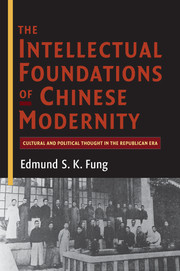 The Intellectual Foundations of Chinese Modernity
The Intellectual Foundations of Chinese Modernity Book contents
- Frontmatter
- Contents
- Acknowledgements
- Abbreviations
- A Note on Romanization
- Introduction
- 1 The Push of Westernized Radicalism
- 2 The Pull of Cultural Conservatism
- 3 The Politics of Modern Chinese Conservatism
- 4 Liberalism in China and Chinese Liberal Thought
- 5 The State, Government and the Rule of Law
- 6 The Rise of Reformist Socialist Thought
- 7 From State Socialism to Social Democracy
- Conclusion
- Glossary
- Selected Bibliography
- Index
- References
7 - From State Socialism to Social Democracy
Published online by Cambridge University Press: 03 May 2010
- Frontmatter
- Contents
- Acknowledgements
- Abbreviations
- A Note on Romanization
- Introduction
- 1 The Push of Westernized Radicalism
- 2 The Pull of Cultural Conservatism
- 3 The Politics of Modern Chinese Conservatism
- 4 Liberalism in China and Chinese Liberal Thought
- 5 The State, Government and the Rule of Law
- 6 The Rise of Reformist Socialist Thought
- 7 From State Socialism to Social Democracy
- Conclusion
- Glossary
- Selected Bibliography
- Index
- References
Summary
China in the 1930s saw the rise of state socialism (guojia shehui zhuyi) as an intellectual current and political movement linked to the minor Chinese State Socialist Party (Zhongguo Guojia Shehuidang), or SSP. State socialism is not defined here as the doctrine that all the affairs of the nation should be managed by the state, regardless of individual choice, or as a form of social organization in which ownership and control of the means of production is all in the hands of the state. Instead, it is interpreted in a Chinese context as evolutionary socialism based on the idea of a strong state and government with a plan, as described in Chapter 5. Chinese state socialism was not an ideology resembling Nazism. It did not have the main characteristics of fascism: antiparliamentarianism, antiliberalism, antibourgeoisie, racism, eugenics, ethnic nationalism and mass movements. It had no links with the Blue Shirts movement, which pledged absolute loyalty to Chiang Kai-shek. Nor was it part of the less-known Italian connection of the 1930s, on which Michael Godley has written. It also had nothing to do with the New Life Movement, which Frederic Wakeman Jr interpreted as a form of ‘Confucian fascism’. Chinese state socialism differed from fascism in that it opposed the notion of the dictator, one-party rule and political tutelage, and it never became a mass movement.
- Type
- Chapter
- Information
- The Intellectual Foundations of Chinese ModernityCultural and Political Thought in the Republican Era, pp. 224 - 255Publisher: Cambridge University PressPrint publication year: 2010


